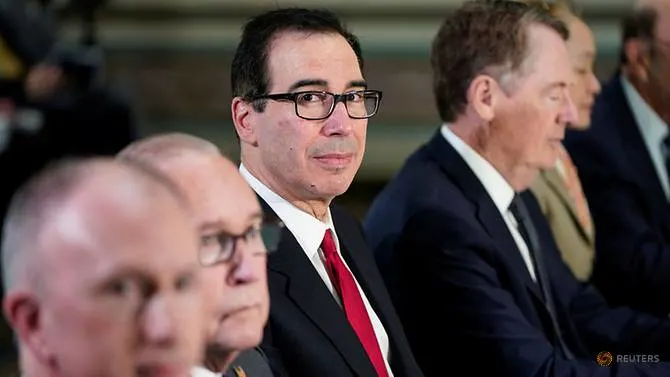China makes unprecedented proposals on tech transfer, trade challenges remain: US officials
28 March, 2019

The United States and China have made progress in all areas under discussion in trade talks, with unprecedented movement on the touchy issue of forced technology transfers, but sticking points remain, US officials told Reuters on Wednesday.
US Trade Representative Robert Lighthizer and Treasury Secretary Steven Mnuchin arrive in Beijing on Thursday (Mar 28) for a new round of talks with Chinese officials to work out a deal that would end a months-long trade war.
The in-person talks, which will be followed by a round in Washington next week, are the first face-to-face meetings the two sides have held in weeks after working past an initial end-of-March goal for a summit between US President Donald Trump and Chinese President Xi Jinping to sign a pact.
Reuters spoke to four senior administration officials for this report.
One official said China had put proposals on the table that went further than in the past, creating hope for a deal that the United States insists must include structural changes in the Chinese economy.
"They're talking about forced technology transfer in a way that they've never wanted to talk about before - both in terms of scope and specifics," he said, speaking on condition of anonymity.
Washington wants Beijing to end practices it says involve the theft of US intellectual property and the forced transfer of American technology to Chinese companies. It wants improved access for American companies to China’s markets and a reduction in Chinese industrial subsidies.
Talks would continue as long as progress continued to be made on the core agreements being negotiated in the deal.
Reuters reported previously that the two sides were working on written agreements in six areas: forced technology transfer and cyber theft, intellectual property rights, services, currency, agriculture and non-tariff barriers to trade.
"If you looked at the texts a month ago compared to today, we have moved forward in all areas. We aren't yet where we want to be," the official said.
The officials declined to lay out a timetable for the talks.
"It could go to May, June, no one knows. It could happen in April, we don't know," another administration official said.
He said intellectual property and enforcement of an eventual deal continued to be sticking points.
'SOME TARIFFS WILL STAY'
The world's two largest economies have slapped tit-for-tat tariffs on hundreds of billions of dollars of goods. China wants the United States to lift its tariffs as part of a deal. Washington, which is cognizant that the tariffs give it leverage to ensure Beijing follows through on any commitments it makes, is wary of lifting them right away.
Trump said last week the United States may leave tariffs on Chinese goods for a "substantial period" to ensure compliance.
"Some tariffs will stay," the second official said. "There's going to be some give on that, but we're not going to get rid of all the tariffs. We can't."
The topic will be addressed in upcoming talks.
"Obviously that is an issue that we need to resolve ... and will be an important part of a final deal," the first official said.
Since July 2018, the United States has imposed duties on US$250 billion worth of Chinese imports, including US$50 billion in technology and industrial goods at 25 per cent and US$200 billion in other products including furniture and construction materials, at 10 per cent.
China has hit back with tariffs on about US$110 billion worth of US goods, including soybeans and other commodities.
